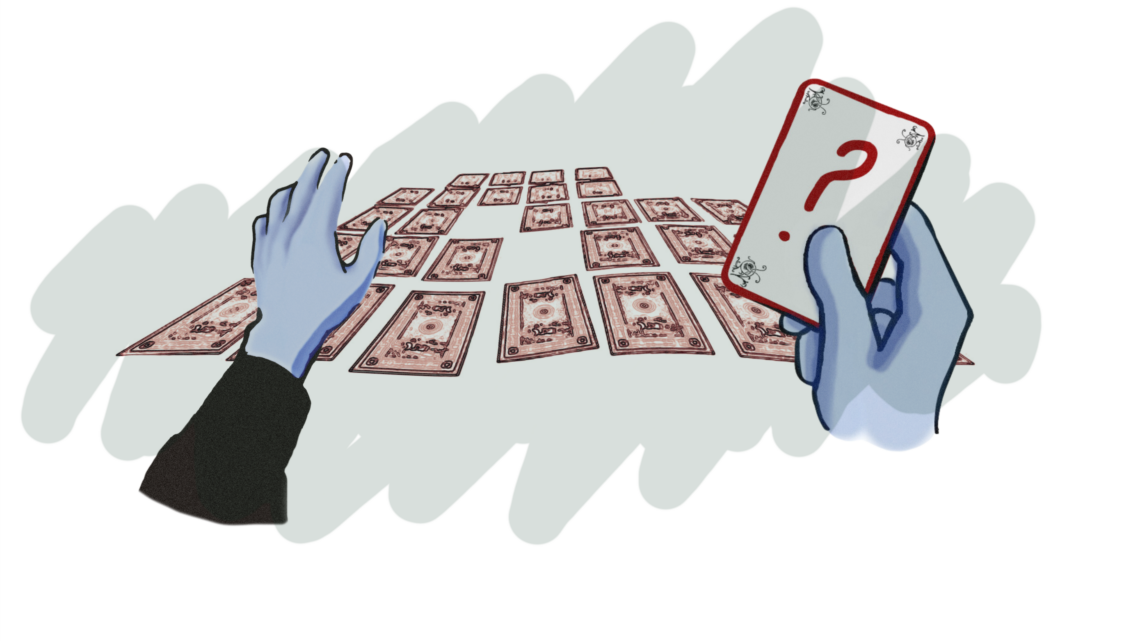The (Un)Reliability of Memory
Illustration by Marlon Schotel
Ronald Cotton was convicted of two counts of rape and two counts of burglary in the winter of 1987.1 The jury believed it was unarguably him. The evidence was so compelling that he was sentenced to life in prison plus 54 years. Police accounts show that one of the two rape victims distinctly recognized him both from a photo and a suspect line-up. Cotton served ten years in prison before evidence that proved his innocence was found, exonerating him from any of the crimes he was accused of.
The evidence was DNA from the crime scene, which was tested and found to match with a different, already convicted criminal, and which showed no match with Cotton’s DNA. The testing was requested by the Innocence Project, a non-profit organisation that strives to free the innocent. The project has already been involved in the exoneration of more than 300 innocent people in the US.2 But why were innocent people convicted of such large-scale crimes despite their innocence? Is it that we cannot rely on eyewitness testimony, which is one of the strongest forms of evidence historically and globally in the judicial system? Research shows that faulty eyewitness testimony is the leading cause of false convictions in at least 75% of exoneration cases.3 This statistic has shocked many researchers, and among them psychologists who were inspired to set out and explore the faltering reliability of our memory.
A study done by Loftus and Palmer4 showed the susceptibility of our memory changes after witnessing a tragic event . Participants were shown a short video of a car crashing into another car, and then received different versions of a questionnaire about the video. Some participants were asked at what speed they thought the car was going when it ‘crashed’ into the other car, others were asked at what speed it was going when it ‘bumped’ into the other car. This slight change of wording, among other language manipulations in the questionnaire, was found to significantly influence the participants’ memory recall and speed of estimation of the video. Those who thought it crashed estimated a higher speed than those who thought it bumped. This portrays the misinformation effect, wherein exposure to information after an event can influence people’s recall of the event. In this case, exposure to a misleading question about the car crash influenced people’s memory recall of the event itself.
This effect can be applied to the courtroom as well. Any type of indication, suggestion, or misleading question could potentially have influenced the rape victim’s recall of Cotton’s face as the rapist. It can even be argued that, especially in emotionally charged situations like this, our memories are much more malleable and susceptible to misinformation.
It is a widely conceived notion that when we experience emotional events, we tend to remember them better. This has been coined as ‘flashbulb memory,’ wherein the emotion is so strong that the memory is vividly picturesque and more accurate than usual.5 It is logical that when we are faced with a critical and meaningful event in our life, we ought to remember every little detail about it. Of course, you remember your graduation ceremony, or the moment you passed your driver’s license – how could you forget? Yet, this was found to be not as accurate as we might have thought. Neisser et al.6 used one such emotional event to test this theory in action. Hundreds of accounts were taken from university students in the US a day after the Challenger disaster occurred.
In 1986, an American space shuttle named Challenger was launched into space, only to explode and completely disintegrate right after its launch, killing all seven shuttle crew members.7 This was a notoriously shocking event in US history, remembered and grieved by many. The university students were asked to give their vivid accounts of what they were doing when they heard about the explosion, where they were, who told them, and other details related to the explosion itself. They were also asked to rate the emotional impact they experienced and their confidence in their account of the details. Several months and years later, these accounts were verified, and the students were asked the same questions as before. Surprisingly, the confident and emotional accounts of the students did not correlate with a better and more accurate recall of the event. In fact, many students vividly recalled exactly what they were doing at the time with great confidence, but their new accounts did not correspond at all to their accounts of the day after the explosion.
This is just one example of how our memories are suggestible and reconstructive, even when we are extremely confident they are not. Similar studies have been conducted after the assassination of Kennedy, the 9/11 bombings and many more events that impacted people’s lives in a significant way.8 Just as the rape victim vividly recalled Cotton’s face in the suspect line-up, we unconsciously reconstruct our memories when faced with certain events, such as a car crash or a space shuttle explosion.
The examples relate to the unreliability of our memories in specific, rousing situations. But it is possible that our memories are not that stable in day-to-day situations either. Have you ever walked into the living room, highly determined to do something, and then completely forgotten what it was? Have you ever gone out of the house and forgotten if you locked the door? Have you ever been convinced your friend was with you in some situation, but they weren’t?
Memory is an amusing mechanism; extremely intricate and yet extremely malleable and impressionable. Of course, it would not be wise to completely distrust your memory or deem it effectively unreliable. After all that, you did lock the door to your house, and you were eventually able to recall what it was you wanted to do in the living room. Rather, it would be wiser to be aware of our faults and imperfections and know that even the strongest computer has a bug sometimes. Simply do your best to remember that your memory is on your side, but sometimes you need more focus.
Endnotes
- Innocence Project, “Ronald Cotton Celebrates 24th Exoneration Anniversary,” August 6, 2019, https://innocenceproject.org/cases/ronald-cotton/.
- Innocence Project. “About – Innocence Project.” Accessed January 23, 2023. https://innocenceproject.org/about/#our-work.
- Brandon L. Garrett, Convicting the Innocent (Cambridge, MA: Harvard University Press, 2011).
- Elizabeth F. Loftus and John Palmer, “Reconstruction of Automobile Destruction: An Example of the Interaction between Language and Memory,” Journal of Verbal Learning and Verbal Behaviour 13, no. 5 (1974): 585–89, https://doi.org/10.1016/s0022-5371(74)80011-3.
- Joyce W. Lacy and Craig E.L. Stark, “The Neuroscience of Memory: Implications for the Courtroom,” Nature Reviews Neuroscience 14, no. 9 (2013): 649–58, https://doi.org/10.1038/nrn3563.
- Ulric Neisser and Nicole Harsch, “Phantom Flashbulbs: False Recollections of Hearing the News about Challenger,” Cambridge University Press EBooks (October 9–31, 1992), https://doi.org/10.1017/cbo9780511664069.003.
- Michael D. Lemonick, “When Our Memories Are Both Vivid and Wrong,” WSJ, January 26, 2017, https://www.wsj.com/articles/when-our-memories-are-both-vivid-and-wrong-1485463900.
- Joyce W. Lacy and Craig E.L. Stark, “The Neuroscience of Memory: Implications for the Courtroom,” Nature Reviews Neuroscience 14, no. 9 (2013): 649–58, https://doi.org/10.1038/nrn3563.

Marlon studied English Language and Culture, with an MA in Youth Literature and in International Education. She thinks Children’s books are a great combination between her love for literature and illustration. With a preference for realism, but a growing interest for more 2D styles, she likes learning to illustrate digitally/digitalize drawings, as well as making lino prints, painting, and engraving. In her free time she likes to knit and read, dance and swim, or make music with her band. You can follow her @marlongiliane.


Beautifully written article, extremely interesting and learnt a lot.
Beautifully written article, extremely interesting and learnt a lot.